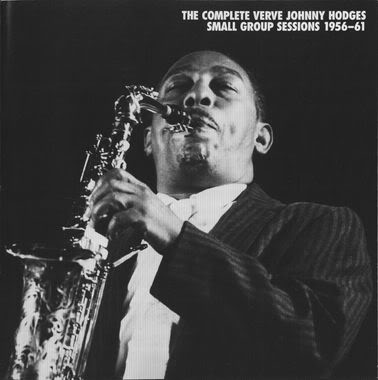Mosaic Records #200
©Laurence Svirchev
 Johnny Hodges, with a series of nicknames like “Rabbit” and “Jeep”, was a musical hero in his time. His alto saxophone sound and phrasing was inimitable. He enjoyed popularity both as leader of his own bands and as a long time member of the Ellington Orchestra (1928 until his death in 1970 with the exception of 1951-55). He was an excellent composer and it is said his concert improvisations were a constant source for Ellington to develop his own compositions. Ellington’s propensity to appropriate his spontaneous compositions annoyed him the to the point that when Hodges walked to the microphone to solo, he often gestured to the Duke by rubbing his thumb and fore-finger together, reminding the maestro of the royalties he never received.
Johnny Hodges, with a series of nicknames like “Rabbit” and “Jeep”, was a musical hero in his time. His alto saxophone sound and phrasing was inimitable. He enjoyed popularity both as leader of his own bands and as a long time member of the Ellington Orchestra (1928 until his death in 1970 with the exception of 1951-55). He was an excellent composer and it is said his concert improvisations were a constant source for Ellington to develop his own compositions. Ellington’s propensity to appropriate his spontaneous compositions annoyed him the to the point that when Hodges walked to the microphone to solo, he often gestured to the Duke by rubbing his thumb and fore-finger together, reminding the maestro of the royalties he never received.
Yet the available CD discography of Hodges as leader of his own bands is slim. Of course, there is plenty of Hodges available as a member of the Ellington Orchestra. Ellington would simply and dramatically announce “Presenting Johnny Hodges” and let the man solo a sultry serenade. What is under-appreciated about the famous 1956 Newport Jazz Festival concert is that Hodges was the man who awoke the sleepy crowd with his solo on Jeep’s Blues and saved a concert that seemed ready to flop. And that set the stage for Gonsalves’ solo on Diminuendo in Blue and Crescendo in Blue. Had Ellington not programmed Hodges first, there may not have been a crowd left to hear Gonsalves.
Fortunately Mosaic has rescued Hodges from obscurity as a leader with the 1956-61 Verve sessions (a follow-up to a sold-out box-set documenting a Hodges septet 1951-55). The six-CD documentation of the recording sessions is meticulous, the sound quality of the 24-bit re-mastering superb. A word to procrastinators, however: this Mosaic set is limited 7,500 copies.
The set contains an amazing array of music, much of it made by the highest caliber jazz musicians such as Billy Strayhorn, Jimmy Hamilton, Ben Webster, Ray Brown, and Jo Jones. But of course the star is Hodges. Disc two has a couple of cuts that feature Hodges soloing all the way through, with Strayhorn feeding complimentary chords. Hodges’ balladry was the ultimate in sensuality. “Gone With The Wind” and “I Didn’t Know About You” demonstrate Hodges’ ultimate mastery and control of the form.
Hodges was not only an interpreter of standards. He was a competent composer of original music. His music consistently provokes the imagination into the state of romance through well-defined story-telling. His compositions and arrangements share a similarity to the “heads” of the Basie band: always fresh, spontaneous, original, and timeless. While his compositions are without lyrics, the titles succinctly match the melodies. Examples include “I Told You So” and “Starting With You I’m Through.” Sometimes the titles are intriguingly inexplicable, like “Hygiene” and “The Peaches Are Better Down The Road.”
The pinnacle of Hodges’ work as a leader comes with the album titled “The Smooth One.” The musicianship surges to an unprecedented level due to the bass work of Ray Brown and the percussion of that greatest of swing drummers, Jo Jones. There are a series of heartfelt compositions about returning to the US from Europe on a cruise boat with titles like “First Klass (C’mon Home)”, “Second Klass”, “Straight Back”, “Steerage”, “Third Klass”.
Hodges’ tone is sensual like no other musicians’. His ballad attack is often slow and dreamy, full of held notes that build to creamy crescendos. At fast or ballad tempo, his artful phrasing is characterized by sliding from note-to-note with delicate accelerations and decelerations. The feel of his solos is often due to tripling or quadrupling the same note, then gracefully glissading into a different inflection. The resulted is the patently silky feel of every Jeep solo. Other musicians might consistently favor the device of tension-release, but when Rabbit takes a run, his attack encompasses a barely felt plasticity and a strongly felt bounce. In spite of the complexity of his music-making, Hodges’ work always sounds simple. This quality perhaps explains why the Hodges sound is unique: no player ever attempted to copy-cat him.
Johnny Hodges was one of the ultimate instrumentalists of music. Anyone who is at all interested in the art of improvisation and the history of American music would be well served by this box set from Mosaic.
Written on Train 157, Beijing to Guìlín, China, 31 August 2001
Originally published in Planet Jazz, Montreal, 2002